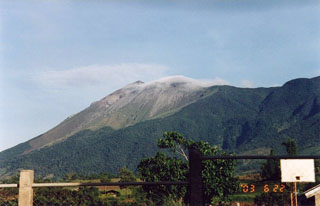Report on Kanlaon (Philippines) — August 1978
Scientific Event Alert Network Bulletin, vol. 3, no. 8 (August 1978)
Managing Editor: David Squires.
Kanlaon (Philippines) Intermittent ash emission continues
Please cite this report as:
Global Volcanism Program, 1978. Report on Kanlaon (Philippines) (Squires, D., ed.). Scientific Event Alert Network Bulletin, 3:8. Smithsonian Institution. https://doi.org/10.5479/si.GVP.SEAN197808-272020
Kanlaon
Philippines
10.4096°N, 123.13°E; summit elev. 2422 m
All times are local (unless otherwise noted)
Canlaon ejected steam and a little ash for 4.5 hours on 2 August. The cloud rose 800-1,400 m above the crater rim. Seismographs recorded local activity. A smaller eruption occurred at 0610 on 9 August, producing a 250-m cloud. [A smaller eruption ended with small explosions on 14 August at 0615 and 2 September at 1600.]
Further Reference. Oanes, A., 1978, 1978 Canlaon volcano eruption: COMVOL report (unpub.).
Geological Summary. Kanlaon volcano (also spelled Canlaon) forms the highest point on the Philippine island of Negros. The massive andesitic stratovolcano is covered with fissure-controlled pyroclastic cones and craters, many of which are filled by lakes. The largest debris avalanche known in the Philippines traveled 33 km SW from Kanlaon. The summit contains a 2-km-wide, elongated northern caldera with a crater lake and a smaller but higher active vent, Lugud crater, to the south. Eruptions recorded since 1866 have typically consisted of phreatic explosions of small-to-moderate size that produce minor local ashfall.
Information Contacts: G. Andal, COMVOL, Quezon City.

